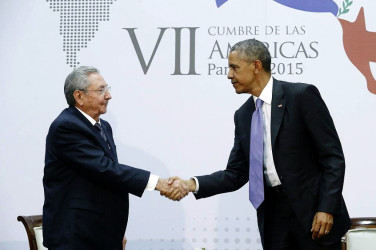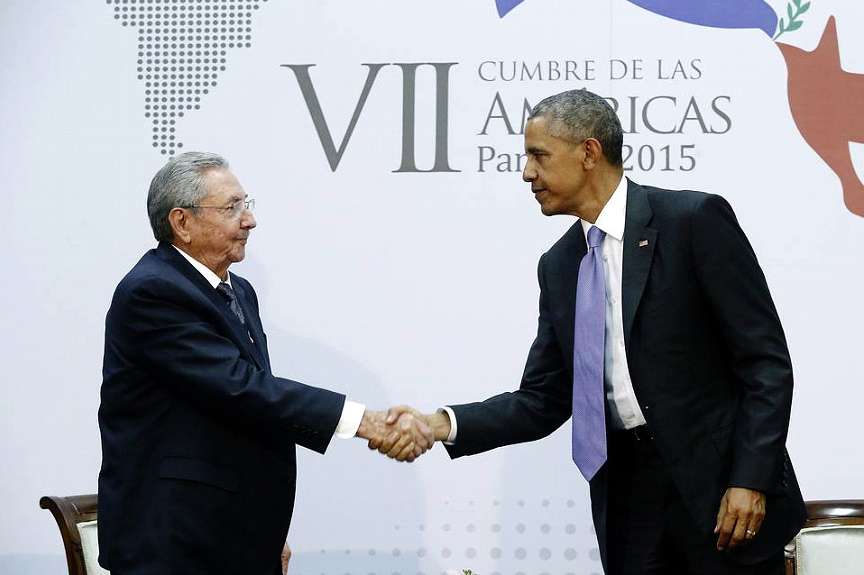Introduction
On April 11, 2015, Presidents Barack Obama and Raul Castro shook hands at the Summit of the Americas in Panama, marking the first meeting between a U.S. and Cuban head of state since the two countries severed their ties in 1961. The meeting came four months after the presidents announced their countries would restore ties. Successive U.S. administrations have maintained a policy of economic sanctions and diplomatic isolation. The change in the countries’ relations, initially marked by a prisoner swap and Havana’s release of a jailed U.S. contractor, prompted some experts to point to better prospects for Cuba’s economy and U.S. relations more broadly in Latin America. But the U.S. trade embargo, which requires congressional approval to be rescinded, is unlikely to be lifted any time soon.
Historical Background

The tumultuous U.S.-Cuba relationship has its roots in the Cold War. In 1959, Fidel Castro and a group of revolutionaries seized power in Havana, overthrowing Fulgencio Batista. Despite misgivings about Castro’s communist political ideology, the United States recognised his government. However, as Castro’s regime increased trade with the Soviet Union, nationalised U.S.-owned properties, and hiked taxes on American imports, the United States responded with escalating economic retaliation. After slashing Cuban sugar imports, Washington instituted a ban on nearly all exports to Cuba, which President John F. Kennedy expanded into a full economic embargo that included stringent travel restrictions.
In 1961 the United States severed diplomatic ties with Cuba and began pursuing covert operations to overthrow the Castro regime. The 1961 Bay of Pigs invasion, a botched CIA-backed attempt to topple the government, fuelled Cuban mistrust and nationalism, leading to a secret agreement allowing the Soviet Union to build a missile base on the island. The United States discovered those plans in October of 1962, setting off a fourteen-day standoff. U.S. ships imposed a naval quarantine around the island, and Kennedy demanded the destruction of the missile sites. The Cuban Missile Crisis ended with an agreement that the sites would be dismantled if the United States pledged not to invade Cuba; the United States also secretly agreed to remove nuclear missiles from Turkey.
Following the events of 1961–62, economic and diplomatic isolation became the major prongs of U.S. policy toward Cuba. This continued even after the Soviet Union’s collapse. Washington strengthened the embargo with the 1992 Cuba Democracy Act and 1996 Helms-Burton Act, which states that the embargo may not be lifted until Cuba holds free and fair elections and transitions to a democratic government that excludes the Castros. (Raul has said he will leave office in 2018) Some adjustments have been made to the trade embargo to allow for the export of some U.S. medical supplies and agricultural products to the island. But the Cuban government estimates that more than fifty years of stringent trade restrictions have amounted to a loss of $1.126 trillion.
Obstacles to U.S.-Cuba Diplomacy
U.S. President Barack Obama came into office seeking greater engagement with Cuba, and in 2009 reversed some of the restrictions on remittances and travel set by his predecessor, George W. Bush. During his first term, Obama also permitted U.S. telecommunications companies to provide more cellular and satellite service in Cuba and allowed U.S. citizens to send remittances to non–family members in Cuba and to travel there under license for educational or religious purposes.
Both countries appeared open to further engagement until Cuban authorities arrested Alan Gross, a U.S. Agency for International Development (USAID) subcontractor, in Havana in 2009. Gross had traveled to the country to deliver communications equipment and arrange Internet access for its Jewish community. Cuban authorities alleged he was attempting to destabilise the Cuban regime and sentenced him to fifteen years in prison. At the same time, Raul Castro wanted to secure the release of the Cuban Five, Cuban intelligence officers arrested in Miami in 1998 and convicted in 2001, who had become national heroes in Cuba.
Another contentious issue between the two countries was Cuba’s designation by the U.S. State Department as a state sponsor of terrorism, a status first assigned in 1982 in light of Fidel Castro’s training of rebels in Central America. Castro announced in 1992 that Cuba would no longer support insurgents abroad, and the State Depart-ment’s annual report for 2013 stated there was no evidence that the country provided training or weapons to terrorist groups. Cuba’s continued inclusion on the list was a major obstacle to talks about restoring diplomatic relations following the 2014 rapprochement. In May 2015, Cuba was removed from the list.
Human rights in Cuba continue to be a concern for U.S. policymakers. In a 2014 report, Human Rights Watch said Cuba “continues to repress individuals and groups who criticise the government or call for basic human rights” through detentions, travel restrictions, beatings, and forced exile. The report also notes that Cuba released dozens of political prisoners and foreigners in Cuban prisons in 2010 and 2011.
U.S. domestic politics in the United States long made a U.S.-Cuba détente politically risky. The Cuban-American community in southern Florida traditionally influenced U.S. policy toward Cuba, and both Republicans and Democrats have feared alienating a strong voting bloc in an important swing state in presidential elections. The Cuban exile community in the Miami area, which makes up about 5 percent of Florida’s population, has been “a pillar of Republican support in presidential elections since 1980,” writes Arturo Lopez-Levy in Foreign Policy. However, recent trends suggest that may change: Obama won the Cuban-American vote in Florida in the 2012 elections.
Council on Foreign Relations Backgrounder
Authors: Danielle Renwick, Copy Editor and Brianna Lee
Updated: May 29, 2015

